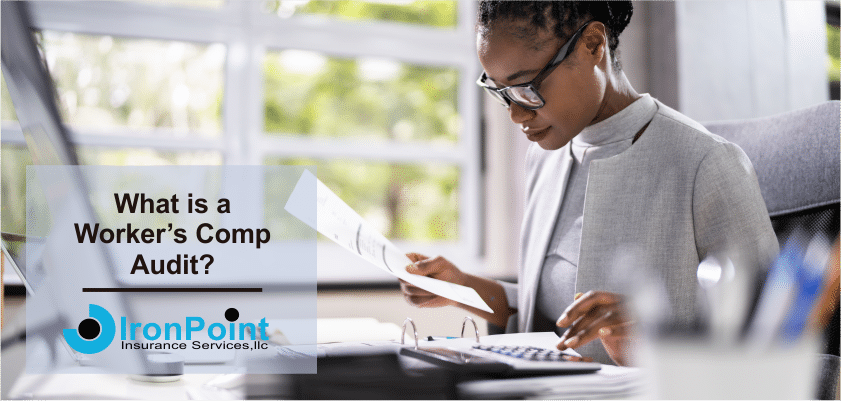How to Handle a Workers Compensation Audit (And Not Lose Sleep)

You’ve got your business running smoothly. Your employees are happy. Your customers are satisfied. Life is good. Then a letter arrives from your insurance company about a “workers compensation audit,” and suddenly you’re googling phrases like “what is this audit thing” and yelling “where’s my insurance agent?”
Let’s get one thing straight: a workers compensation audit isn’t the boogeyman of the business world that many entrepreneurs make it out to be. In fact, I’m going to suggest something radical here – it might actually be good for your bottom line.
Yes, you read that correctly. The audit that’s currently causing your heart palpitations could put money back in your pocket. Intrigued? You should be.
The Audit Nobody Talks About (Until It’s Too Late)
If you’ve just started your business journey, you bought your first workers comp policy, and you’re approaching renewal.
The term workers compensation audit is going to be completely new territory.
Don’t feel bad – you’re not alone in this confusion. Most business owners have a vague understanding that workers comp insurance is required, but the audit process remains shrouded in mystery until that first notice arrives.
Here’s the simple truth: a workers compensation audit is just a review process to ensure the premium you paid matches the actual exposure your business had during the policy period.
It’s like checking the receipt after dinner to make sure you weren’t charged for that extra appetizer you never ordered.
Workers Compensation Insurance: The Basics You Pretend to Already Know
Before we dive deeper into the audit process, let’s level-set on what workers compensation insurance actually is. (And no, it’s not a scheme invented by insurance companies to fund their exotic vacations.)
Workers compensation insurance provides benefits to employees who are injured or become ill due to their job. These benefits typically cover:
- Medical expenses
- Lost wages
- Rehabilitation costs
- Death benefits (in worst-case scenarios)
This insurance serves as a protective shield for both parties: employees get necessary coverage for work-related injuries or illnesses, and employers gain protection from potentially devastating lawsuits. It’s essentially a “no-fault” system where employees receive benefits regardless of who caused the accident, and in return, they generally give up the right to sue their employer for negligence.
In most states, it’s not optional – it’s the law. And unlike that “optional” extended warranty on your office printer, this is one purchase you don’t want to skip.
Why Workers Compensation Audits Exist (And No, It’s Not Just to Ruin Your Day)
Let’s address the elephant in the room: why do insurance companies insist on conducting these audits? Is it just another way to extract more money from your business?
Despite what your inner skeptic might suggest, there are legitimate reasons for workers compensation audits:
- Premium Accuracy: When you first purchase workers comp insurance, you provide an estimate of your annual payroll. The audit confirms if this estimate was accurate.
- Regulatory Requirements: Workers compensation is one of the most heavily regulated insurance types. In many states, carriers are legally required to conduct audits.
- Risk Assessment: Business operations change. Maybe you added a new service line or shifted employee roles. These changes can affect your risk profile.
- Financial Protection: If your payroll decreased during the policy period, an audit ensures you’re not overpaying for coverage. Yes, you read that right – the audit could result in money coming back to you.
Think of it this way: you wouldn’t want to pay for a full tank of gas when you only needed half, would you? The audit makes sure you’re paying for the exact amount of “workers comp gas” your business actually used.
The Audit Process: What Really Happens Behind the Curtain
Now that we’ve established why audits exist, let’s pull back the curtain on what actually happens during a workers compensation audit.
First, breathe. This isn’t a tax audit. Insurance auditors aren’t looking to “catch” you doing something wrong. They’re simply trying to verify information.
The typical audit process follows these steps:
1. Notification
You’ll receive notice that an audit is coming. This could be a physical letter, an email, or a phone call. Unlike surprise birthday parties, insurance companies don’t believe in audit surprises.
2. Information Gathering
The auditor will request specific documents, which typically include:
- Payroll records
- Federal tax forms (like 941s or W-2s)
- State unemployment tax reports
- Job descriptions
- Certificates of insurance for subcontractors (if applicable)
- General ledger information
3. The Actual Audit
Depending on the size of your business, the audit might be conducted:
- In-person at your place of business
- By mail (you send in the requested documents)
- Over the phone
- Electronically through an online portal
4. Analysis and Determination
The auditor reviews all information to verify your payroll figures, employee classifications, and subcontractor usage. They’re checking if the premium you paid aligns with your actual exposure.
5. Results and Adjustments
After completing the analysis, you’ll receive the audit results. This might lead to:
- No change in premium (your estimates were spot-on)
- A refund (you overpaid based on your actual exposure)
- An additional premium (your actual exposure was higher than estimated)
The whole process can take anywhere from a few weeks to a few months, depending on the complexity of your business operations and how quickly you provide the requested information.
Possible Outcomes: The Good, The Bad, and The “I Should Have Been More Accurate”
Let’s be frank about what happens after a workers compensation audit is completed. There are three potential scenarios:
Scenario 1: The Goldilocks Outcome
Your payroll estimates were just right. No additional premium is due, and no refund is coming your way. While this might not feel exciting, it’s actually ideal – it means your initial estimates were accurate, and you paid exactly what you should have.
Scenario 2: The Happy Surprise
The audit reveals that your actual payroll was lower than estimated. Perhaps you had fewer employees than anticipated, or business slowed down.
The result?
A premium refund. It’s like finding money in the pocket of a coat you haven’t worn since last winter – unexpected but definitely welcome.
Scenario 3: The Budget Buster
Your actual payroll exceeded your estimates. Maybe your business grew faster than expected (congratulations!), or perhaps you misclassified some employees. Either way, you’ll owe additional premium. This isn’t a penalty – it’s simply paying for coverage you already received.
Common reasons for audit adjustments include:
- Business growth or contraction affecting employee count
- Misclassification of employees
- Improper documentation of subcontractors
- Changes in the nature of work performed
- Inclusion of overtime in payroll calculations (most states require this to be stripped out)
Here’s a pro tip that most insurance agents won’t tell you: You don’t have to wait for the audit to adjust your policy. If you notice significant changes in your payroll throughout the year, contact your agent to update your estimates. This can help prevent a shocking adjustment at audit time.
Preparing for Your Audit: How to Avoid Looking Like a Deer in Headlights
The key to a smooth workers compensation audit isn’t complicated – it’s preparation. Here’s how to set yourself up for success:
Maintain Accurate Records Year-Round
Don’t wait until audit time to get your paperwork in order. Keep detailed, organized records of:
- Payroll by employee and classification
- Job descriptions and duties
- Overtime payments (separated from regular payroll)
- Subcontractor information and certificates of insurance
- Owner/officer payroll information
Understand Your Employee Classifications
One of the most common audit issues stems from employee misclassification. Each type of work has its own classification code and corresponding rate. A clerical worker has a much lower rate than a roofer, for obvious reasons. Make sure you understand how your employees should be classified based on their actual duties – not just their job titles.
Properly Document Subcontractor Relationships
If you use subcontractors, maintain copies of:
- Their workers compensation certificates of insurance
- Contracts outlining the work relationship
- Invoices for all work performed
Without proper documentation, your insurer might treat subcontractors as employees during the audit, significantly increasing your premium.
Designate an Audit Point Person
Choose someone in your organization who understands your payroll, operations, and record-keeping systems to be the main contact for the audit. This ensures that the auditor gets accurate information and that questions are answered correctly.
Ask Questions Before the Auditor Does
Review your current policy and note any areas where you’re uncertain if your business operations align with your coverage. It’s better to identify and address potential issues before the audit rather than being caught off-guard.
Be Professional, But Don’t Overshare
During the audit, be cooperative and transparent with the information requested. However, don’t volunteer additional information that hasn’t been asked for. Provide exactly what’s needed – no more, no less.
The Biggest Audit Mistakes Business Owners Make (That You Won’t)
Now that you know how to prepare, let’s talk about the common pitfalls to avoid:
- Playing Hide and Seek with Information — Attempting to conceal information isn’t just unethical – it’s ineffective. Auditors have seen it all, and dishonesty can result in policy cancellation or even fraud charges. Be transparent.
- Misclassifying Employees to Save Money — I get it – placing all your workers in lower-rate classifications sounds tempting. But this short-term saving strategy will catch up with you during the audit, resulting in additional premium plus potential penalties.
- Treating Subcontractors Like Employees (or Vice Versa) — The distinction between employees and independent contractors matters significantly for workers comp. Make sure your classifications align with IRS guidelines and state regulations.
- Ignoring the Audit Notice — Burying your head in the sand won’t make the audit disappear. In fact, not responding to audit requests can lead to policy cancellation or arbitrary premium increases based on estimates.
- Failing to Review the Audit Results — Always review your audit results carefully. Mistakes happen, and you have the right to dispute findings that don’t align with your business reality.
The Bottom Line: Embracing the Audit
Let’s wrap this up. The workers compensation audit isn’t something to dread – it’s a necessary business process that ensures you’re paying the appropriate premium for your actual risk exposure. When approached with preparation and understanding, it can be relatively painless and might even benefit your bottom line.
Remember these key points:
- Audits are a standard procedure, not a reflection on your business practices
- Accurate record-keeping throughout the year is your best defense
- Understanding employee classifications can save you significant money
- The audit might result in a refund if your payroll was lower than estimated
- You can update your policy throughout the year as your business changes
If you still have questions about your upcoming audit or need guidance on preparing, don’t hesitate to contact your insurance agent. They should be your ally in this process, not your adversary.
And if you don’t have an agent you trust, consider contacting us. We believe in making the complex world of business insurance understandable and manageable – even those dreaded audits.
Not a fan of the phone, start the conversation online – get a quote today.
Because at the end of the day, a workers compensation audit isn’t the end of the world. It’s just another business process to master on your entrepreneurial journey. And now you know exactly how to handle it like a pro.
Let’s Get Started
Select the way you want to start your quote.
Let’s Get In Touch
Compare Quote Online

Compare Business Quotes
Looking for business insurance? Click “Start a Quote” to compare Business Owner’s Policy and Worker’s Compensation rates. Ready to purchase? Choose “Quote & Buy Online” to buy directly online.
Rather speak with an insurance agent?
1-877-334-7646






